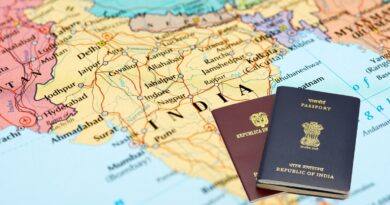Dual Citizenship And The Indian Diaspora:All You Need To Know Now
The Indian Diaspora and India
The Indian diaspora is a term used to refer to the global community of people of Indian descent living outside of India. This community, which is estimated to be around 32 million people, is spread across the world and has a significant presence in countries such as the United States, the United Kingdom, Canada, and the United Arab Emirates.
The Indian diaspora has a long history of migration, dating back to the colonial period when indentured labour was brought to various parts of the world, particularly countries in the Caribbean, Africa, and Southeast Asia. Today, the diaspora is a diverse and multi-faceted community, comprising people of Indian origin from different regions, religions, and socio-economic backgrounds.
The Indian diaspora has played an important role in shaping the cultural, economic, and political landscape of the countries in which they live. They have been successful in businesses, politics, and academia. Indian-origin people have held high public offices in countries like the USA, UK, Canada, Singapore, and many more. They have also been active in preserving and promoting Indian culture and traditions through organisations and community events.
One of the key issues facing the Indian diaspora is the question of identity and belonging. Many members of the diaspora struggle to reconcile their Indian heritage with their identities as citizens of their host countries. The concept of dual citizenship provides a way for members of the diaspora to maintain a connection to their Indian heritage while also fully participating in the societies of their host countries.
Another important issue for the Indian diaspora is the question of economic opportunities. Many members of the diaspora have been successful in business and have made significant contributions to the economies of their host countries. However, they have often faced barriers to fully participating in the economies of their home countries. The Indian government’s efforts to provide dual citizenship and greater economic opportunities for the diaspora are seen as a way to address these issues and encourage greater economic engagement between the diaspora and India.
India’s policy on citizenship for overseas Indians has been criticised for not providing dual citizens with full political rights, such as the right to vote in Indian elections or to hold public office. Additionally, dual citizens are not allowed to acquire agricultural or plantation properties in India. These limitations have been seen as a major hindrance to encouraging the diaspora to invest in India.
In recent years, the Indian government has been taking steps to engage with the diaspora and provide them with greater opportunities to connect with their homeland. One of these efforts has been the introduction of the concept of “Overseas Citizenship of India” (OCI).
This move is seen as a way to strengthen the ties between the diaspora and India and to provide them with greater opportunities to invest, work, and study in India. The OCI card holder is entitled to a lifelong visa for visiting India and a multiple-entry, multi-purpose lifelong visa for visiting India. They are also eligible for benefits like parity with NRIs in economic, financial, and educational fields, except in certain fields like the acquisition of agricultural or plantation properties.
However, India’s citizenship policy is not as liberal as that of other countries like the USA, Canada, and many more. It doesn’t allow the dual citizenship.
The Indian diaspora is a significant and influential community that has made important contributions to the countries in which they live. The Indian government has been taking steps to engage with the diaspora and provide them with greater opportunities to connect with their homeland through the concept of dual citizenship. While the concept of dual citizenship has not been allowed yet even if it is being proposed for greater engagement and investment between the diaspora and India, it still has limitations in terms of political rights and property ownership. The Indian government is taking steps to address these limitations, but much more needs to be done to fully realise the potential of the diaspora as a vital link between India and the world.
Indian Diaspora and the Dual Citizenship.
“Perfect freedom is as necessary to the health and vigour of commerce as it is to the health and vigour of citizenship”. Patrick Henry.
A reporter in Kolkata questioned Abhijit Banerjee’s mother about his citizenship as the Nobel Prize was presented, noting that he had only recently become a citizen of the United States in 2017. His mother said, “He travels a lot.
In 2019, the Indian passport falls to position 86 from 77 in 2010. This ranking shows how many nations allow passport holders to enter with no visa or with a visa upon arrival. India is one of the world’s major sources of illegal immigration due to its high poverty rate (311 Indians have just been deported from Mexico).
Regardless of how big of a global “power” anyone believes India has become, developed nations will not grant the Indian passport easy access into their airports any time soon. For this reason, bright and affluent Indians who frequently travel and reside abroad prefer to obtain foreign citizenship. For the majority of Indians, obtaining foreign citizenship is not “anti-national,” but rather a practical consideration. Anyone who has applied for a visa to the US or the UK will understand.
4.5 lakh Indians chose foreign citizenship between 2014 and 2017. The trend will only increase as more nations grant easy citizenship in return for money and investments.
The Indian government is being downright stupid by not granting dual citizenship to such Indians. Dual citizenship is available in 85 nations worldwide. India must join this lengthy list in order to prevent embarrassing situations like an Indian winning the Nobel Prize despite not being an Indian citizen.
Citizenship of India under the constitutional provisions
- The Constitution of India governs citizenship in India under Articles 5–11 (Part II) of the Constitution.
- The Citizenship Act, 1955, is the legislation dealing with citizenship that has been amended by the Citizenship (Amendment) Act, 1986, the Citizenship (Amendment) Act, 1992, the Citizenship (Amendment) Act, 2003, and the Citizenship (Amendment) Act, 2005.
- Nationality in India mostly follows the jus sanguinis (citizenship by right of blood) and not the jus soli (citizenship by right of birth within the territory).
Article 5: Citizenship at the Commencement of the Constitution
This article discusses citizenship for people at the commencement of the Constitution, i.e., January 26, 1950. Under this, citizenship is conferred upon those who have their domicile in the Indian Territory and
- Who was born in Indian territory; or
- Whose either parent was born in Indian territory; or
- Who has ordinarily been a resident of India for not less than 5 years immediately preceding the commencement of the Constitution.
Article 6: Citizenship of certain persons who have migrated from Pakistan
Any person who has migrated from Pakistan shall be a citizen of India at the time of the commencement of the Constitution if:
- He or either of his parents or any of his grandparents was born in India, as given in the Government of India Act of 1935, and
- (a) in case such a person has migrated before July 19th, 1948 and has been ordinarily resident in India since his migration, or
- (b) in case such as a person has migrated after July 19th, 1948, and he has been registered as a citizen of India by an officer appointed in that behalf by the government of the Dominion of India on an application made by him thereof to such an officer before the commencement of the Constitution, provided that no person shall be so registered unless he has been resident in India for at least 6 months immediately preceding the date of his application.
Article 7: Citizenship of Certain Migrants to Pakistan
This article deals with the rights of people who migrated to Pakistan after March 1, 1947, but subsequently returned to India.
Article 8: Citizenship of certain persons of Indian origin residing outside India
This article deals with the rights of people of Indian origin residing outside India for purposes of employment, marriage, and education.
Article 9: People voluntarily acquiring citizenship of a foreign country will not be citizens of India.
Article 10: Any person who is considered a citizen of India under any of the provisions of this Part shall continue to be a citizen and will also be subject to any law made by the Parliament.
Article 11: Parliament to regulate the right of citizenship by law
The Parliament has the right to make any provision concerning the acquisition and termination of citizenship and any other matter relating to citizenship.
Indian Citizens living abroad can be categorised as:
- NRI: Non-Resident Indian
- PIO: Persons of Indian Origin
- OCI: Overseas Citizen of India
NRI:-
An NRI is an Indian citizen who travels outside of India for work, conducts business, engages in a profession outside of India, or who declares an intention to travel overseas for an unforeseen period of time. Non-resident Indians are citizens of India who travel overseas to work. He is an Indian national who spends a total of 183 days outside of India in a fiscal year. To become an NRI, no application is necessary. An individual’s annual tax filing, which is subject to change each year, serves as the official record of their status as an NRI. If you want to open an NRI bank account, let your bank know.
Opening special bank accounts with Indian banks and being able to borrow money against securities held in NRO (Non Resident Ordinary Rupee), NRE (Non Resident External Rupee), and FCNR (Financial Currency Non Resident Bank) accounts without a ceiling are just a few of the advantages that an NRI can enjoy. This means that an NRI does not have to pay a maximum amount for the marginal securities that he invests in. They may use loans to purchase a home or other property, among other things. There are no limits on purchasing residential or commercial property in India without the RBI’s approval. In India, they can buy mutual fund units, debentures, and shares. If an NRI pays taxes in the country where he lives, his income is not taxed in India.
If an NRI is present in India at the time of voting, they are eligible to use the other benefits, which include the right to vote. The University Grants Commission (UGC) regulations state that they have a 15% reservation in Indian educational institutions.
An NRI, however, also has some restrictions. Although NRIs can obtain loans for housing or business purposes, they need authorization to withdraw funds they have invested in India. He is not allowed to buy a farm house or any property for farming. An NRI may vote, but he is not permitted to run for political office. Additionally, he is prohibited from working for the government of India.
PIO:-
A person of Indian origin who has a 15-year-long visa for Non- Indian citizens. As per the Gazette of India (Part-I, Section-I) published on January 9, 2015, all the existing Persons of Indian Origin (PIO) card holders registered as such under the New PIO Card Scheme 2002 shall be deemed to be Overseas Citizens of India Cardholder. It means that the PIO Card Scheme has been discontinued w.e.f. 9th January, 2015. Hence, conscious and continuous efforts are made by the Indian state to urge all PIO card holders to convert their PIO cards into OCI cards.
OCI
Section 7A of the Citizenship Act, 1955, defines an OCI as a person of Indian origin who is a foreign national and gets registered as an Overseas Citizen of India Cardholder. In order to be an OCI, he should be an Indian citizen, either one of his parent or an ancestor who is/ was an Indian citizen, a person married to an Indian citizen, or an existing OCI for at least two continuous years.
- Citizenship at the commencement of the Constitution
- Citizenship by birth
- Citizenship by descent
- Citizenship by registration
- Citizenship by naturalisation
- By incorporation of territory (by the Government of India)
- People who were domiciled in India as on 26th November 1949 automatically became citizens of India by virtue of citizenship at the commencement of the Constitution.
- Persons who were born in India on or after 26th January 1950 but before 1st July 1987 are Indian citizens.
- A person born after 1st July 1987 is an Indian citizen if either of the parents was a citizen of India at the time of birth.
- Persons born after 3rd December 2004 are Indian citizens if both parents are Indian citizens or if one parent is an Indian citizen and the other is not an illegal migrant at the time of birth.
- Citizenship by birth is not applicable for children of foreign diplomatic personnel and those of enemy aliens.
Termination of Indian Citizenship
Termination of citizenship is possible in three ways, according to the Act:
- Renunciation: Any Indian citizen who is also a citizen of another nation and renounces his Indian citizenship through a declaration made in the way specified by law loses his Indian citizenship. Every minor kid of a guy who loses his Indian citizenship likewise loses his Indian citizenship. However, by declaring his decision to reclaim Indian citizenship within a year of reaching legal adulthood, such a child may become a citizen of India.
- Termination: Indian citizenship can be terminated if a citizen knowingly or voluntarily adopts the citizenship of any foreign country.
- Deprivation: In specific circumstances, the Indian government has the power to revoke a person’s citizenship. But not all citizens are covered by this. It only applies to people who have obtained citizenship through registration, naturalisation, or merely by virtue of Article 5 Clause (c) (which is citizenship at commencement for a domicile in India and who has ordinarily been a resident of India for not less than 5 years immediately preceding the commencement of the Constitution).
According to the Ministry of Home Affairs, there are four ways in which Indian citizenship can be acquired: birth, descent, registration, and naturalisation. The provisions are listed under sections 3, 4, 5(1), and 5(4) of the Citizenship Act, 1955.
Does India allow dual citizenship?
The Indian Constitution does not allow holding Indian citizenship and citizenship of a foreign country simultaneously. However, based on the high level committee of the Indian diaspora, the Government of India decided to grant Overseas Citizenship of India (OCI). As per the Passports Act, 1967, it is mandatory for all Indian passport holders to surrender their passports to the nearest Indian mission or post immediately after acquiring the nationality of another country.
Hence, Section 9 of the Citizenship Act, clearly prohibits Dual citizenship. As per the ministry of external affairs (MEA) with the MHA, 1.63 lakh persons surrendered their Indian citizenship in 2021 against 85,236 in 2020 and 1.44 lakh in 2019, which is a serious concern. According to the reports, over 43% of the 3.92 lakh people who gave up Indian citizenship in the last 3 years (2019-2021) became citizens of the US itself, with the rest from across a dozen other counties.
As India does not provide dual citizenship, as many as 362 Indians living in China also acquired Chinese citizenship.
A person with dual citizenship is able to work in both countries, and he or she can decide for themselves which country offers the better job prospects. Additionally, individuals who hold two citizenships can aid in the transfer of a nation’s culture and environment to another. People with dual citizenship are able to hold property and exercise their rights in both nations.
….. Adv. Jose Abraham





